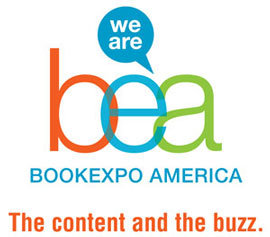
I’ve just attended this year’s Book Expo America (BEA) at the Javits Center and, no question about it, the book industry is shrinking. Only two years ago there were two floors of exhibits; this year there was less than one. The far right of the exhibit hall was separated from the publishers’ booths by a curtain. A quick peek behind it revealed countless book stalls with remaindered books, every author’s graveyard. On the other side of the hall, working from left to right were the aisles of companies producing works for digital media, publishing companies for mixed media creations, and companies for the protection of intellectual properties. Clearly, we’re at the beginning of a transition to digital media dominance. Books are on the wane.
I must confess, as someone who is in the vanguard of trends, (I started writing on a computer in 1983, went online in 1992, and have recently started a company using Web 2.0 technology) that I now own a Nook Color. I bought it so that I could read the New York Times online. Unfortunately, since I have a subscription directly from the Times and not from the Nook sellers, Barnes & Noble, I don’t have the proper app to read the paper (sic) on the Nook without the text suddenly disappearing when I touch the screen the wrong way. So I’ve learned how to read it on my Droid—a screen a LOT smaller than the broadsheet newspaper. But even here, scrolling fingers often produce the next column and I have to backtrack to the piece I had been reading and then find the place where I was so rudely interrupted. On weekends, I get the actual paper. What a relief to spread the whole thing in front of me so that I can quickly scan (with my own eyes) all the headlines and decide what to read!
Between the U.S. and the U.K., technology changes in the print world have produced almost a half million new titles and new editions in English every year. For any author, it takes a bit of doing just to get noticed in this sea of print. But the digitization of everything infinitely expands the field, allowing all the wannabes to become published authors as well. Help! So much to read! So hard to find your way! So little time! Search engines come to the rescue. But they presuppose that you know what you’re looking for. Aye, there’s the rub!
There are a lot of reasons to recommend a physical book. Aside from the obvious that they don’t require electricity so that they are ready entertainment during a power failure, books are a presence awaiting discovery. An independent bookseller I met at BEA reminded me that his business depends on people walking out of his store with a book they never expected to buy. Think of all the discoveries you’ve made browsing library shelves. Personal bookshelves tell you a lot about an individual. (It upset me to learn recently that interior designers are not putting bookshelves into new homes.) And for the researcher, browsing through print material often produces a serendipitous discovery that no search engine could ever generate. The rush one gets from uncovering such a find is something that keeps all researchers going. On a primal level, books perpetuate the joy of the hunt.
Print is regarded as more permanent than digital material. Traditionally, material that is to be printed is edited, copy edited, vetted for accuracy, and proofread before publication. The team behind the book wants to make sure that it is as good as it can be since it is supposed to last a long time. The standards are not so high for online publishing, which can be updated on a daily basis, posing a real challenge to the pack rats of the Library of Congress who are compelled to save everything. It will also challenge researchers of the future, who will have to wade through a lot more stuff to find the nuggets that give their work added value.
The information age is giving us immediate, unprecedented access to the written, spoken, filmed, and otherwise recorded expression of the world’s humanity. It is not, however, a substitute for the well-thought out, well-reasoned, powerfully presented, language-rich and sometimes beautifully illustrated body of work that is printed literature in book form. In our enthusiasm to embrace the new, I hope we’re not throwing out the baby with the bathwater. It is quite likely that books will become increasingly valuable, prestigious, and expensive, much as the theater, once the entertainment for the masses, is now a high-priced experience.


Leave a comment